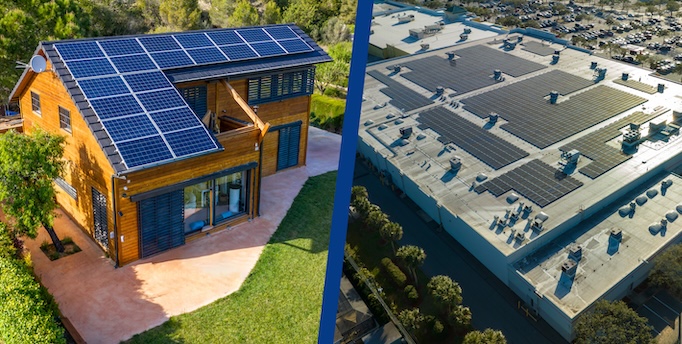The Solar Industry
Despite a few gray clouds of uncertainty, the United States solar industry continues to have a strong growth outlook. The market installed 8.6 gigawatts-direct current (GWdc)1 of solar manufacturing capacity in the third quarter of 2024, continuing a trend of record-setting quarterly volumes. Photovoltaic (PV) solar accounted for 64%1 of all new additions to electricity-producing capacity through Q3 2024, remaining a predominant form of new generating capacity.
The commercial sector showed solid growth with 535 megawatt-direct current (MWdc)1 installed in Q3 2024, a substantial 44%1 year-over-year increase from Q3 2023. This was primarily due to California's NEM 2.0 projects2 and substantial growth in states such as Illinois, New York ad Maine. Less mature commercial solar markets, such as Arkansas, Delaware, Michigan, Oklahoma and Washington, also had high quantities of installation volumes.
On the contrary, residential solar – such as solar panels for home use – dropped 39%1 year-over-year mainly due to elevated interest rates and customer uncertainty, which may stem from several factors, including fluctuating energy prices, varying state-specific guidelines and concerns about long-term maintenance and reliability of solar systems. According to The Solar Energy Industries Association®, average annual volumes are predicted to be at least 43 GWdc1 from 2025-2029.
Homeowners and builders alike continue to take advantage of solar leases of power purchase agreements (PPAs)3 (i.e., “solar agreements”), in which customers essentially “lease” solar power from a third-party solar provider without the upfront cost of purchasing an entire system.
5 Tips for Guiding Your Clients
Though over 4.2 million homes4, and many commercial and community projects, have adopted solar power in 2024, it is known to create unique challenges when selling a property. Some issues that sellers have experienced include:
• Buyers shying away from a property because of the solar agreement (due to issues like lease length, lease payment, lease contracts, maintenance considerations, technology obsolescence and more)
• Buyers who may not meet the solar company’s qualifications to lease
• Potential issues involving the proper transfer of the solar agreement
If you’re working with a seller who currently owns a property with a solar agreement, you may be able to help them navigate complications with the sale. While every situation is different, here are a few steps to consider:
1. Start early. If you represent the seller, ask them early in the selling process whether the property is tied to a solar agreement. The terms for transferring a solar agreement may impact the marketability of a property, and disclosure to potential buyers is important.
2. Request a copy of the solar lease agreement. Ask your client for a copy of the current solar agreement. If they don’t have one, they should request it from their solar company.
3. Seek advice. Unfortunately, misconceptions about solar agreements are common. It’s important that buyers and sellers fully understand the terms of their solar agreement, including its transfer rights and requirements at the time of the sale. Many solar companies have dedicated representatives to assist with the lease transfer process, but you may wish to advise your client to consult with an attorney first.
4. Cover all your bases. When selling a property subject to a solar agreement, it helps to work with a trusted company like Old Republic Title. We can alert you to potential title problems, such as an unrecorded solar easement and other possible title issues that need to be addressed prior to closing.
5. Keep lines of communication open. Early in the process, provide your closing team with as much information as possible about the transaction. What they don’t know could cause delays to the closing process.
If you would like to learn more about how you can guide the sale of a property subject to a solar agreement, or find out what information your closing team might need, contact your Old Republic Title representative today.
1Solar Energy Industries Association® and Wood MacKenzie Power & Renewables (2024, December 4). U.S. Solar Report Insight®, https://seia.org/research-resources/us-solar-market-insight/
2California Public Utilities Commission. Net Metering (NEM) 2.0 Evaluation. https://www.cpuc.ca.gov/industries-and-topics/electrical-energy/demand-side-management/customer-generation/net-energy-metering-nem-2-evaluation
3United States Environmental Protection Agency (2025, January 16). Understanding Third-Party Ownership Financing Structures for Renewable Energy. https://www.epa.gov/greenpower/understanding-third-party-ownership-financing-structures-renewable-energy
4Solar Insure (n.d.) How Many Americans Have Solar Panels in 2024? https://www.solarinsure.com/how-many-americans-have-solar panels#:~:text=In%20conclusion%2C%20the%20landscape%20of,million%20solar%20panels%20installed%20nationwide
